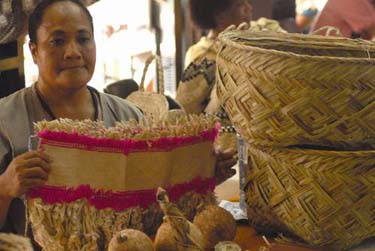From Fijitimes Online (30 October 2008)
Jiurie promotes art and craft
 |
Jiurie Marseu Henry |
ON Friday afternoon, like following an unspoken instruction, young girls throughout the village come together and move out into the pandanus plantations.
Led by an elder woman, the young girls are taught how to pick the natural resource that has undoubtedly been at the core of Pacific identity.
Returning to the village; the girls sort out their pickings before retreating to their homes for a hard-earned meal and a well-deserved rest.
At the crack of dawn on Saturday morning, the village is a buzz of activity with all the women and children going about their daily chores.
After the men have had their fill with a scrumptious meal of hot home-made buns, scones or puddings, they move out into their gardens to tend to their crops.
Meanwhile, the women and their daughters gather on the white sandy beach for the rest of the morning that is filled with jokes, laughter and a serious lesson in a cultural practice that has in some places stood the test of time.
Tutored by their talented elders, the young girls are taught the skill of weaving the pandanus leaves into magnificent mats and other traditional crafts. This is a scene that existed in villages throughout Fiji for many centuries but is now becoming a distant memory for many as the rushing modern times creep into our unique communal lifestyles.
But like a few determined people in this day and age, Jiurie Marseu Henry is committed to not allow this tradition to die in the villages on her home island of Rotuma.
The 45-year-old Noatau villager is working with women and girls on the island to ensure that the Rotuman art and craft remain for centuries to come.
Mrs Henry, who was the sole representative from Rotuma at the Rural Women's Market in Nadi over the past two days, said she could not imagine a lifestyle without the traditional art and craft.
Recalling the days when she accompanied her mother and grandmother to the cultural lessons, the mother of two said they were days filled with a lot of fun.
Now the Rotuma Women Council's Women's Interest assistant, Mrs Henry said preservation of the Rotuman art of mat weaving was necessary because it was unique to the island.
The mother of two said the fine mats (apei and tofua) that are created by the women of Rotuma uses a species of pandanus, known to the locals as the "Sa'aga" or "Eap Rotuma" that cannot be found anywhere else in Fiji.
Mrs Henry said she moves around to villages identifying the talented women and encouraging them to pass their skills onto the younger generations.
She said art and craft were a part of their identity and Rotuma would miss a vital link if the skills of fine mat weaving were lost.
She said the mission of preserving the tradition was close to her heart because she grew up getting first hand experience of how it was slipping away.
Mrs Henry said she hoped to see all the young girls on the island equipped with the skill of weaving fine mats.
She also said many women on Rotuma do not realise that some of the crafts they create could fetch a lot of money.
One of the small fine mats that Mrs Henry had on display at the Rural Market in Nadi was valued at $500.
This desire to preserve and promote Rotuman traditional arts and crafts was the main reason for her presence at the Rural Women's Market in Nadi.
Displaying the white fine mats and other crafts created by some of the women on Rotuma, Mrs Henry said the rural market gave her the opportunity to expose their art to the people of Fiji.





